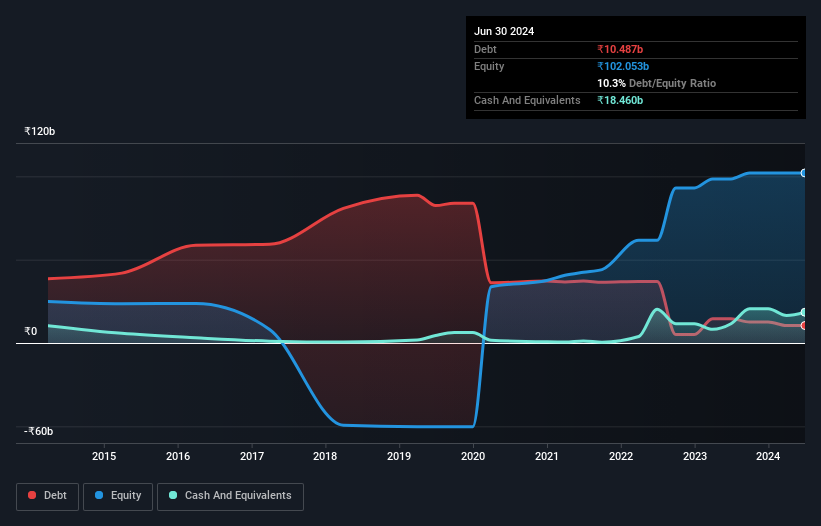Does Patanjali Foods (NSE:PATANJALI) Have A Healthy Balance Sheet?

Legendary fund manager Li Lu (who Charlie Munger backed) once said, 'The biggest investment risk is not the volatility of prices, but whether you will suffer a permanent loss of capital.' It's only natural to consider a company's balance sheet when you examine how risky it is, since debt is often involved when a business collapses. Importantly, Patanjali Foods Limited (NSE:PATANJALI) does carry debt. But should shareholders be worried about its use of debt?
When Is Debt A Problem?
Debt assists a business until the business has trouble paying it off, either with new capital or with free cash flow. If things get really bad, the lenders can take control of the business. However, a more usual (but still expensive) situation is where a company must dilute shareholders at a cheap share price simply to get debt under control. By replacing dilution, though, debt can be an extremely good tool for businesses that need capital to invest in growth at high rates of return. When we think about a company's use of debt, we first look at cash and debt together.
See our latest analysis for Patanjali Foods
What Is Patanjali Foods's Debt?
You can click the graphic below for the historical numbers, but it shows that Patanjali Foods had ₹10.5b of debt in March 2024, down from ₹14.5b, one year before. However, it does have ₹18.5b in cash offsetting this, leading to net cash of ₹7.97b.

How Strong Is Patanjali Foods' Balance Sheet?
The latest balance sheet data shows that Patanjali Foods had liabilities of ₹30.3b due within a year, and liabilities of ₹287.0m falling due after that. On the other hand, it had cash of ₹18.5b and ₹17.1b worth of receivables due within a year. So it can boast ₹5.01b more liquid assets than total liabilities.
This state of affairs indicates that Patanjali Foods' balance sheet looks quite solid, as its total liabilities are just about equal to its liquid assets. So while it's hard to imagine that the ₹673.5b company is struggling for cash, we still think it's worth monitoring its balance sheet. Simply put, the fact that Patanjali Foods has more cash than debt is arguably a good indication that it can manage its debt safely.
On top of that, Patanjali Foods grew its EBIT by 46% over the last twelve months, and that growth will make it easier to handle its debt. When analysing debt levels, the balance sheet is the obvious place to start. But it is future earnings, more than anything, that will determine Patanjali Foods's ability to maintain a healthy balance sheet going forward. So if you want to see what the professionals think, you might find this free report on analyst profit forecasts to be interesting.
But our final consideration is also important, because a company cannot pay debt with paper profits; it needs cold hard cash. Patanjali Foods may have net cash on the balance sheet, but it is still interesting to look at how well the business converts its earnings before interest and tax (EBIT) to free cash flow, because that will influence both its need for, and its capacity to manage debt. During the last three years, Patanjali Foods produced sturdy free cash flow equating to 64% of its EBIT, about what we'd expect. This cold hard cash means it can reduce its debt when it wants to.
Summing Up
While it is always sensible to investigate a company's debt, in this case Patanjali Foods has ₹7.97b in net cash and a decent-looking balance sheet. And we liked the look of last year's 46% year-on-year EBIT growth. So we don't think Patanjali Foods's use of debt is risky. There's no doubt that we learn most about debt from the balance sheet. However, not all investment risk resides within the balance sheet - far from it. These risks can be hard to spot. Every company has them, and we've spotted 1 warning sign for Patanjali Foods you should know about.
When all is said and done, sometimes its easier to focus on companies that don't even need debt. Readers can access a list of growth stocks with zero net debt 100% free, right now.
New: Manage All Your Stock Portfolios in One Place
We've created the ultimate portfolio companion for stock investors, and it's free.
• Connect an unlimited number of Portfolios and see your total in one currency
• Be alerted to new Warning Signs or Risks via email or mobile
• Track the Fair Value of your stocks
Have feedback on this article? Concerned about the content? Get in touch with us directly. Alternatively, email editorial-team (at) simplywallst.com.
This article by Simply Wall St is general in nature. We provide commentary based on historical data and analyst forecasts only using an unbiased methodology and our articles are not intended to be financial advice. It does not constitute a recommendation to buy or sell any stock, and does not take account of your objectives, or your financial situation. We aim to bring you long-term focused analysis driven by fundamental data. Note that our analysis may not factor in the latest price-sensitive company announcements or qualitative material. Simply Wall St has no position in any stocks mentioned.
About NSEI:PATANJALI
Patanjali Foods
Engages in the processing of oil seeds and refining crude oil for edible use in India.
Flawless balance sheet with reasonable growth potential.
Similar Companies
Market Insights
Community Narratives



